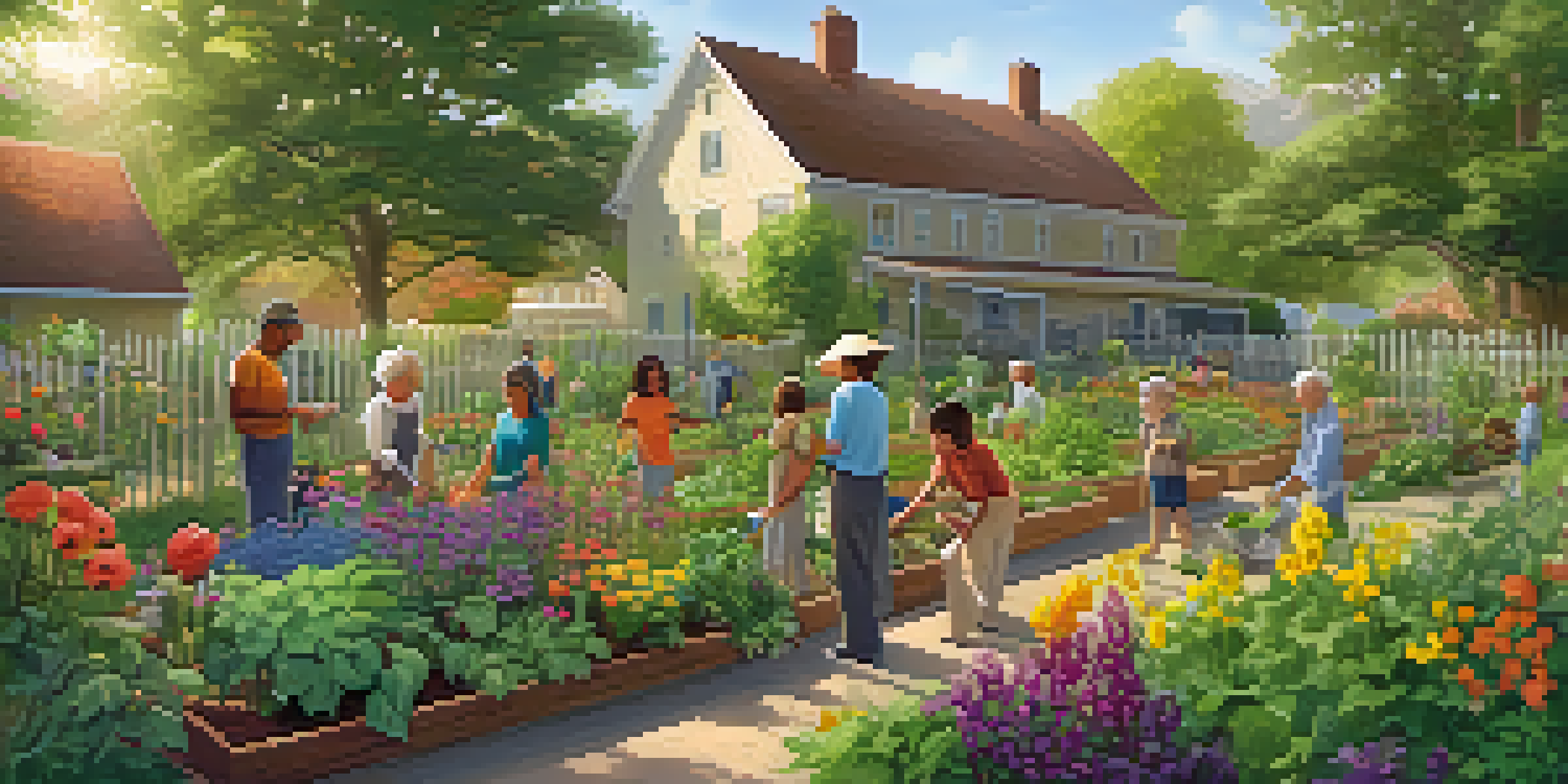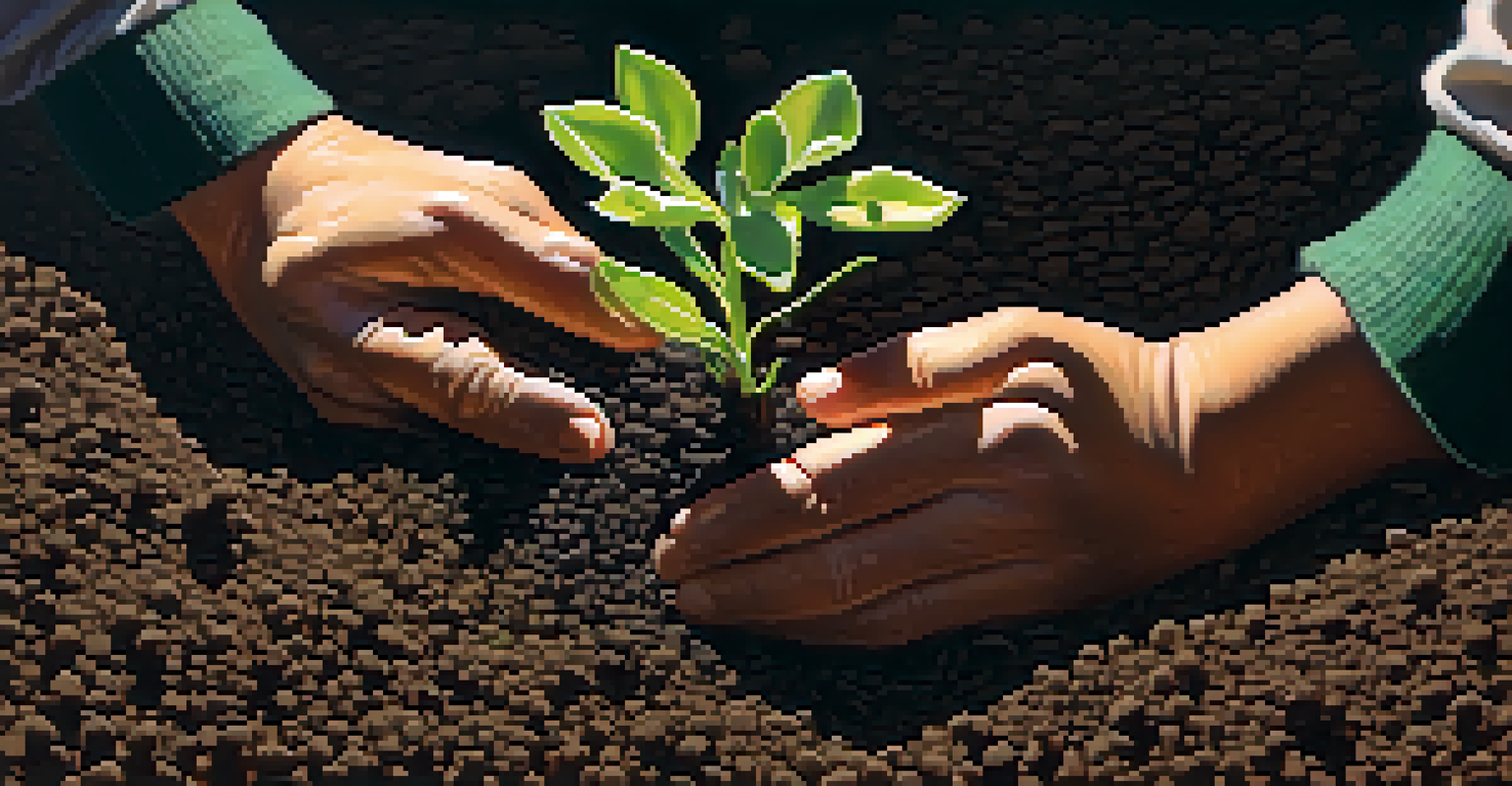How Community Gardening Supports Emotional Healing and Growth

The Therapeutic Benefits of Gardening on Mental Health
Gardening is often described as a peaceful escape, allowing individuals to connect with nature. This connection can lead to reduced stress levels, as tending to plants promotes relaxation and mindfulness. When we focus on nurturing our gardens, we momentarily set aside our worries, creating a mental space for healing.
Gardening adds years to your life and life to your years.
Moreover, studies have shown that interacting with soil can even boost serotonin levels, the 'feel-good' hormone. This natural boost can help combat feelings of depression and anxiety, making gardening a holistic approach to emotional well-being. Just like a good friend, plants can provide comfort and companionship.
As we engage with plants, we learn patience and resilience, qualities that are essential for emotional growth. Watching our efforts bloom into beautiful flowers or ripe vegetables serves as a rewarding reminder that growth takes time and care. This journey can be incredibly empowering, fostering a stronger sense of self.
Building Community Through Shared Gardening Experiences
Community gardening creates a sense of belonging, bringing people together with a shared purpose. Collaborating on gardening projects allows individuals to form bonds, share stories, and support each other emotionally. This connection can be especially valuable for those who may feel isolated or lonely.

The act of working side by side in a garden cultivates trust and camaraderie. As neighbors come together to plant seeds, weed, and harvest, they’re not just growing food; they’re nurturing friendships. These social connections can significantly enhance emotional resilience, providing a network of support during challenging times.
Gardening Enhances Mental Health
Engaging with gardening reduces stress and boosts emotional well-being through mindfulness and connection with nature.
Additionally, community gardens often become safe spaces where individuals can express themselves openly. Whether it’s through sharing gardening tips or discussing personal struggles, these interactions foster a culture of empathy and understanding. It’s a beautiful reminder that we’re all in this together, cultivating both gardens and relationships.
Gardening as a Mindfulness Practice for Emotional Clarity
Mindfulness is all about being present in the moment, and gardening offers the perfect backdrop for this practice. As we dig our hands into the soil and pay attention to the textures, colors, and scents around us, we train our minds to focus on the here and now. This can lead to greater emotional clarity and a deeper understanding of our feelings.
To plant a garden is to believe in tomorrow.
Engaging in repetitive tasks like planting seeds or watering plants can also provide a meditative experience. These simple acts encourage us to slow down and reflect, allowing thoughts and emotions to surface without judgment. It’s akin to a form of moving meditation, helping us process complex feelings and find inner peace.
Through this mindful approach, we can cultivate a healthy relationship with our emotions. Instead of feeling overwhelmed by them, we learn to observe and accept all feelings as part of our human experience. Gardening becomes a safe space to explore these emotions, fostering personal growth and emotional healing.
The Role of Nature in Emotional Healing
Nature has a remarkable ability to heal, and community gardens are perfect examples of this. Surrounded by greenery and the beauty of blooming flowers, individuals often find solace and comfort. The sights and sounds of nature can act as a balm for the soul, easing feelings of anxiety and stress.
Research suggests that spending time in green spaces can help lower cortisol levels, the hormone linked to stress. The tranquility of a garden environment encourages relaxation, making it easier for individuals to process their emotions. It’s like stepping into a natural therapy session, where the beauty of nature nurtures our emotional well-being.
Community Builds Strong Connections
Community gardening fosters relationships and a sense of belonging, providing emotional support and shared experiences.
Furthermore, the act of nurturing plants encourages us to reflect on our own growth and healing. Just as plants flourish with the right care, we, too, can learn to thrive in a supportive environment. This realization can inspire hope and motivate individuals to seek positive changes in their lives.
Fostering Life Skills Through Gardening
Community gardening isn’t just about growing plants; it’s also about developing essential life skills. Participants often learn about responsibility, as taking care of a garden requires consistent effort and dedication. This sense of accountability can translate to other areas of life, boosting confidence and self-esteem.
Moreover, gardening teaches valuable skills such as teamwork, problem-solving, and patience. Working with others to overcome challenges, like dealing with pests or unpredictable weather, fosters a sense of collaboration. These experiences can enhance interpersonal skills, making participants more adept at navigating relationships both inside and outside the garden.
As individuals cultivate these skills, they also cultivate a sense of purpose and achievement. Each successful harvest serves as a reminder of their abilities, reinforcing the idea that they can overcome obstacles. This newfound confidence can lead to personal growth, encouraging individuals to take on new challenges in their lives.
Creating a Sense of Accomplishment Through Gardening
One of the most rewarding aspects of community gardening is the tangible sense of accomplishment it provides. Whether it’s the first sprout breaking through the soil or a bountiful harvest, these milestones can boost self-esteem and foster a sense of pride. Each success, no matter how small, contributes to emotional healing.
These achievements serve as reminders that hard work and dedication pay off, reinforcing a growth mindset. When we see the fruits of our labor, it encourages us to set and pursue further goals, both in gardening and other aspects of life. It’s a cycle of positivity that can lead to significant personal growth.
Gardening Reduces Stress and Anxiety
Connecting with nature through gardening promotes relaxation and boosts serotonin levels, aiding in emotional well-being.
Moreover, sharing the fruits of our labor with others can enhance feelings of joy and connection. Whether it’s gifting vegetables to neighbors or cooking meals for the community, these acts of sharing can amplify our sense of purpose. The joy of giving back can be a powerful catalyst for emotional healing.
The Lasting Impact of Community Gardening on Well-Being
The benefits of community gardening extend far beyond the growing season, creating lasting impacts on emotional well-being. Participants often find themselves more connected to their communities and more attuned to their own emotions. This ongoing relationship with gardening can continue to nurture personal growth and healing.
As people engage in gardening over time, they may develop a deeper appreciation for nature and the environment. This connection can lead to increased mindfulness in everyday life, encouraging individuals to seek balance and harmony. Gardening becomes a lifelong practice of emotional support and growth.

Ultimately, the lessons learned in the garden—resilience, patience, and community—can shape the way we navigate life's challenges. Community gardens remind us that healing is a journey, not a destination, and that we can always find ways to grow and flourish. With each season, we have the opportunity to cultivate new beginnings.